Hits and misses of the Steve Ballmer era at Microsoft
|
|
When he took over
leadership of Microsoft in 2000 Ballmer had to follow iconic co-founder
Bill Gates, who had built the software titan into the most valuable
company in the world. Then Ballmer was blindsided by the swift rise of
Steve Jobs and Apple, whose iPod, iPhone and iPad led a mobile
revolution and made Microsoft appear slow and out of touch.
On a more positive note,
Ballmer has been credited more recently for re-imagining the company's
core product with the bold Windows 8 operating system and leading a 2013
revival of Microsoft's once-flagging stock.
Under his reign,
Microsoft has a mixed record of success with its consumer products.
Here's a look at some of the company's more notable hits and misses of
the Ballmer era.
Hits
Windows XP -- This version of Microsoft's desktop operating system was released in 2001 and used on more than 80% of PCs
at its peak. The software also showed surprising staying power: Many IT
managers, frustrated by the buggy Microsoft Vista, downgraded to the
older but more reliable XP. Today, 12 years after its launch, XP still runs almost 39% of the world's desktop computers.
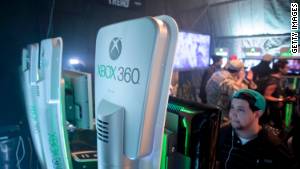
Microsoft says a new upgrade will turn the Xbox 360 into a hub for all television viewing.
Xbox --
Launched in 2001, the venerable video gaming console and its successor,
the Xbox 360, have sold more than 100 million units. Some blockbuster
games, such as the "Halo" and "Gears of War" series, are available only
for the Xbox. Its Kinect system was hailed as a step forward in
motion-control gaming, while Xbox Live, Microsoft's online multiplayer
gaming network, now has more than 46 million members worldwide.
Microsoft will release its next-generation console, the Xbox One, in
November.
Bing --
Ballmer in 2009 introduced Microsoft's Bing search engine, which drew
praise for its attractive visuals and predictive-text features that
produced search suggestions before users were done typing queries. It
won't challenge Google's dominance any time soon, but Bing has emerged
as a credible rival. It has gradually increased in popularity and now commands almost 18% of the U.S. search engine market.
Windows Phone 7 (and 7.5) --
With this launch in late 2010 and early 2011, Microsoft completely
rebuilt its mobile operating system from the ground up by adding a more
intuitive interface, better social-networking tools and a high-def
screen with colorful "live tiles." It was a radical move for a company
that for years had been playing it safe.
Misses
Internet Explorer 6
-- This version of Microsoft's widely used desktop browser was roundly
criticized for its security flaws and lack of support for modern Web
standards.
Zune --
In 2006, Microsoft finally launched its answer to Apple's hot-selling
iPod. But the clunky Zune line of portable media players never caught
on, and by late 2009 their market share had dropped to 2%. It didn't
help that at midnight on December 31, 2008, all of Zune's 30GB models
froze up for a day -- a problem with the way the device's internal clock
recognized (or didn't recognize) leap years. Microsoft put the Zune out
of its misery in 2011.
Vista
-- Released in 2007, this successor to Windows XP was an immediate dud.
Critics complained about its cost, sluggish speed, restrictive licensing
terms and how Vista aimed to discourage the copying of protected
digital media. One survey of corporate users found only 8% said they were "very satisfied" with the operating system. Stung by the reaction, Microsoft rushed out Windows 7 less than three years later.
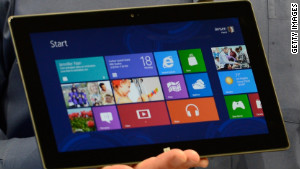
The Microsoft Surface, running Windows 8.
Surface tablets --
Again, Microsoft found itself chasing Apple, this time with a belated
attempt to dethrone the market-leading iPad. Launched in October 2012 --
more than two years after the original iPad -- the Surface tablet was
Microsoft's first attempt to integrate its new Windows 8 operating
system with its own hardware.
Despite some good
reviews, the Surface hasn't clicked with consumers. Microsoft earned
only $853 million from the Surface between its launch last fall and the
close of the company's fiscal year -- a small fraction of iPad sales
revenue during that time. Said AllThingsD, "That's a particularly sad showing for the tablet, given the blustering smack-talk with which Microsoft launched the device."
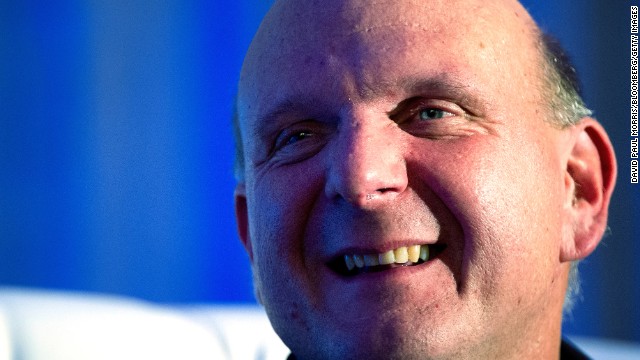 Steve Ballmer, Microsoft's
longtime CEO, is not one to hide his emotions. The burly chief
executive, who announced Friday that he is stepping down within 12
months, is known for his exuberant persona at tech events. Here's a look
at some of his many mugs.
Steve Ballmer, Microsoft's
longtime CEO, is not one to hide his emotions. The burly chief
executive, who announced Friday that he is stepping down within 12
months, is known for his exuberant persona at tech events. Here's a look
at some of his many mugs.
 Here Ballmer responds during an interview at a 2000 tech conference in Florida. If only we knew what the question was.
Here Ballmer responds during an interview at a 2000 tech conference in Florida. If only we knew what the question was.
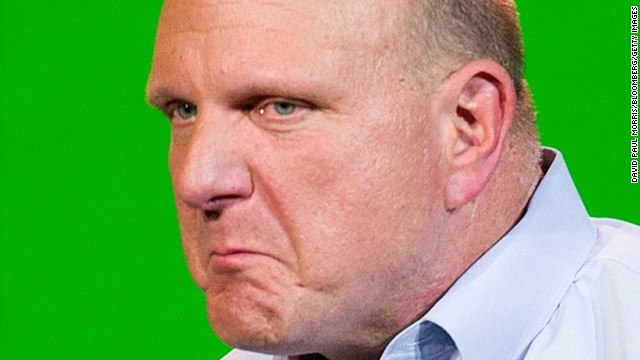 "Don't ask me again about Windows Vista."
"Don't ask me again about Windows Vista."
 Oh, this is a caption contest waiting to happen. Here Ballmer speaks at the Web. 2.0 Summit in 2011 in San Francisco.
Oh, this is a caption contest waiting to happen. Here Ballmer speaks at the Web. 2.0 Summit in 2011 in San Francisco.
 Here Ballmer (pick
one: 1. grimaces 2. grins 3. remembers he left the stove on) while
talking about Windows 7 during a 2009 appearance in Munich, Germany.
Here Ballmer (pick
one: 1. grimaces 2. grins 3. remembers he left the stove on) while
talking about Windows 7 during a 2009 appearance in Munich, Germany.
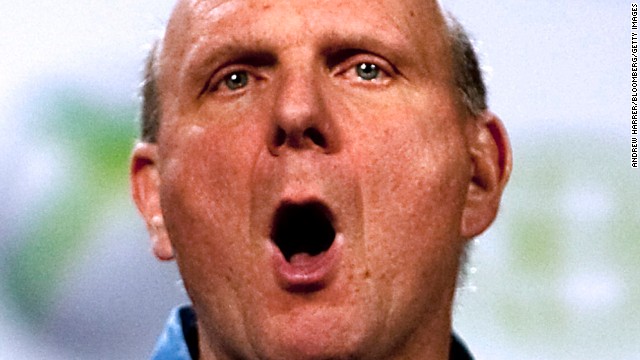 "I'll shout louder so you guys in the back can hear me."
"I'll shout louder so you guys in the back can hear me."
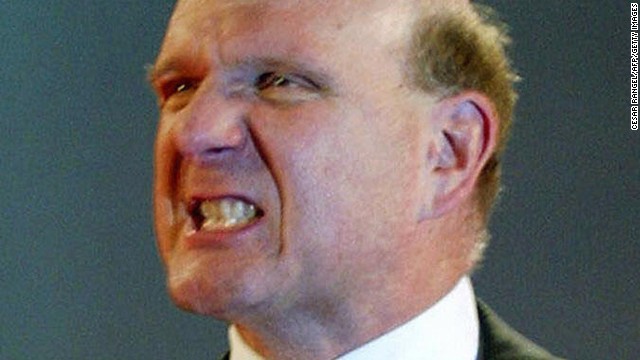 If this Microsoft thing hadn't worked out, Ballmer might have made a fearsome football coach.
If this Microsoft thing hadn't worked out, Ballmer might have made a fearsome football coach.
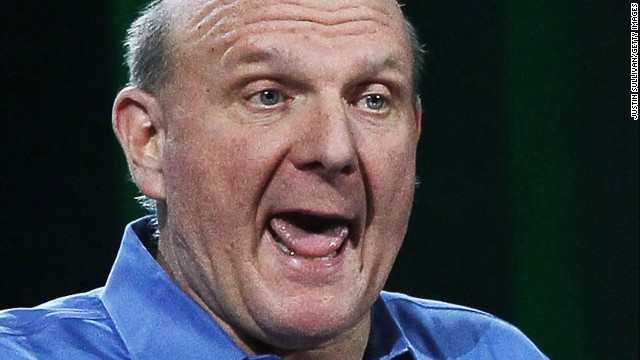 "Well, Apple has had some success, sure. And Facebook is big. Don't get me started on Google. ... What was the question again?"
"Well, Apple has had some success, sure. And Facebook is big. Don't get me started on Google. ... What was the question again?"
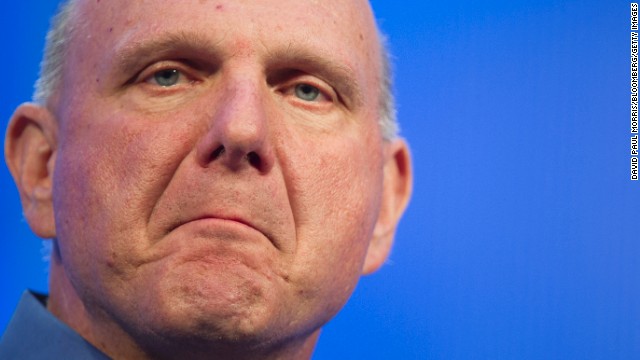 Please don't make Steve Ballmer angry. Just don't.
Please don't make Steve Ballmer angry. Just don't.
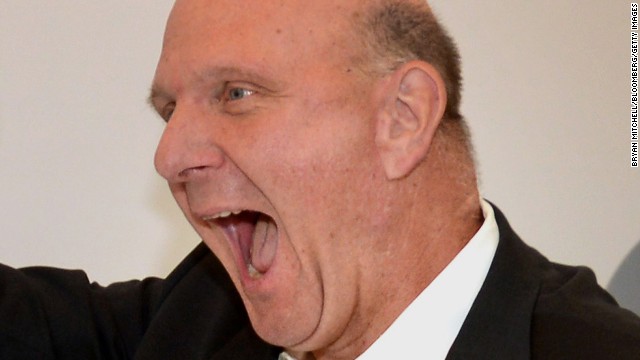 Ballmer speaks, or perhaps yells excitedly, during the 2013 opening of a Microsoft store in Troy, Michigan.
Ballmer speaks, or perhaps yells excitedly, during the 2013 opening of a Microsoft store in Troy, Michigan.
No comments:
Post a Comment